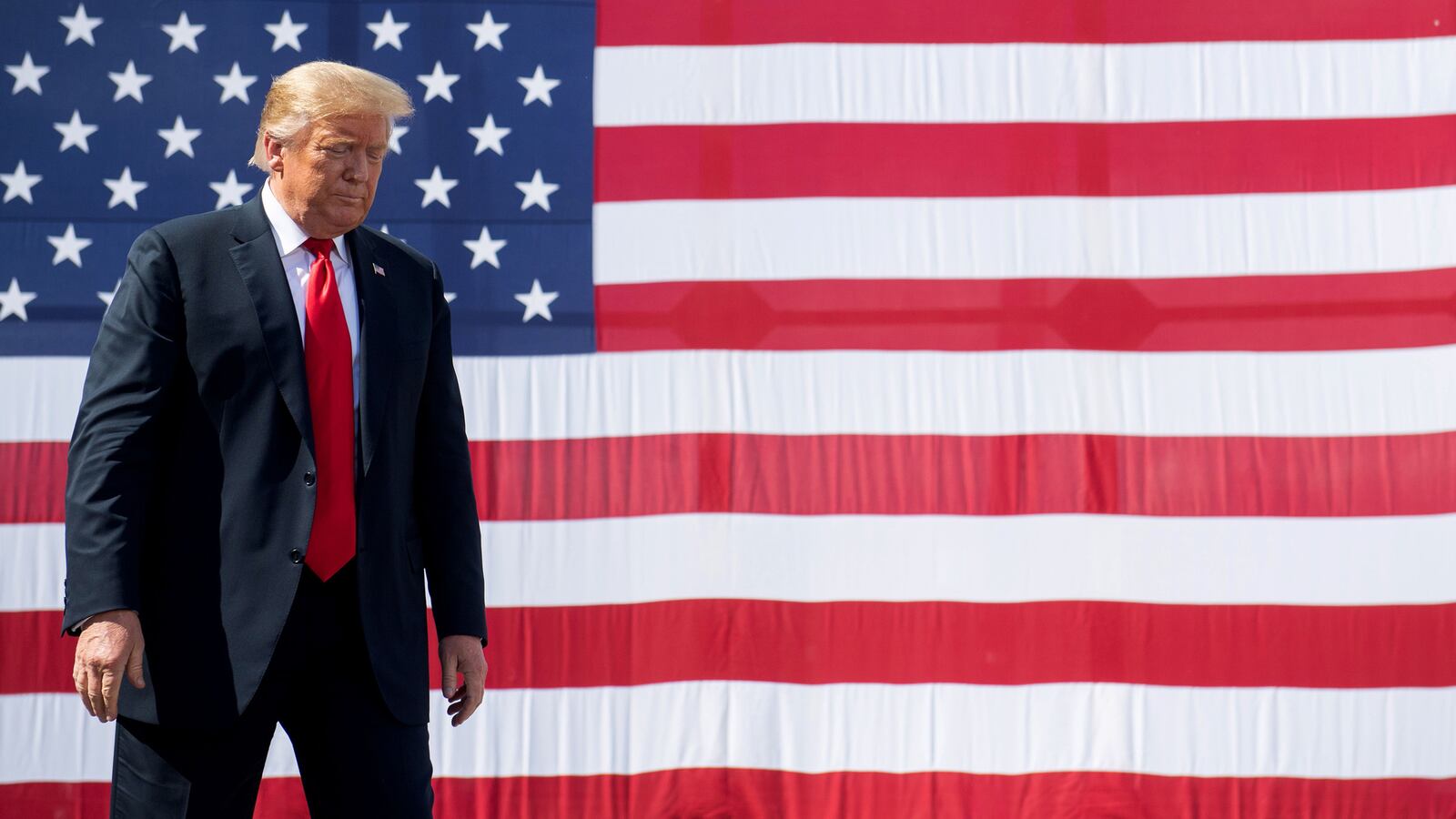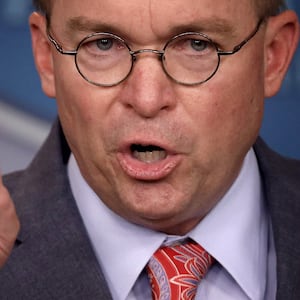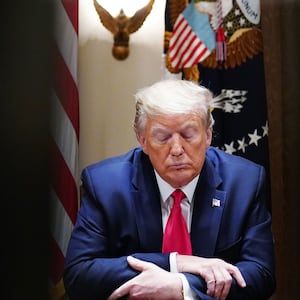In the past month, during which two U.S. jobs reports have shown signs of an economic rebound from the depths of coronavirus-related ruin, President Donald Trump has focused largely on what often matters most to him: not getting public credit.
According to three people who’ve independently spoken to the president, Trump makes a point of regularly complaining that the media has not given him the kudos he deserves for “leading” what he deems to be a smashing economic recovery. He’s argued that if former Vice President Joe Biden were in the White House during the current moment, the media would be fawning over the strong job gains, including the nearly five million jobs that the Labor Department reported on Thursday had been added over the last month ending in mid-June.
Trump’s gone so far as to suggest that Democrats would want to build “statues” honoring Biden, one of the sources said. Elsewhere, he’s griped about how the “phony” polls conducted by independent organizations aren’t reflecting more voter enthusiasm about economic rejuvenation, another source recounted.
Trump’s mounting frustrations underscore the degree to which he’s tied his personal political fortunes to the state of the economy. And they come as a major collision with Democrats over the economy’s future emerges on the horizon. By the end of July, a host of policies that had been put in place to lessen the damage of COVID-19 when it first hit are set to expire. But while there is emerging consensus that the government must step in to prevent the possibility of tens of millions of Americans losing their proverbial safety net, there remains wide disagreement over what, exactly, that patchwork should entail. It’s a disagreement worsened, in part, by a belief among some Trump hands that the economy is recovering quite well, despite unemployment lingering at 11 percent and with estimates suggesting that 25 million Americans remain out of work.
Trump’s top economic adviser, Larry Kudlow, summarized the prevailing sentiment inside 1600 Pennsylvania Avenue when, speaking Thursday morning, he declared that the time for generous unemployment insurance had passed and that Congress would be wise to focus on financial incentives for companies to rehire workers. Stephen Moore, a conservative economist and close friend of Kudlow’s who informally advises Trump, said in a brief interview Wednesday that he’d sent the White House a recent study, which he co-authored, arguing that “you’d see a lot more unemployment” if unemployment benefits were extended with more generous benefits and no incentives for recipients to reenter the workforce. The study posits that the benefits in the first coronavirus-related stimulus package kept the jobless rate artificially higher than it otherwise would have been.
“If our numbers are accurate, it’s hard to see how Trump can get re-elected with millions and millions of people unemployed,” Moore said.
But not everyone in Trump’s orbit is bullish on the current trajectory. Some of the president’s top advisers working on his reelection effort have grown increasingly concerned that modest economic gains between now and the election in November simply won’t be enough to drag their candidate across the finish line to a second term, four individuals familiar with the matter say. Two of these sources—one a Trump campaign official and the other a senior White House aide—recalled feeling nervous last month when they saw no polling bump from news of higher retail sales and the 2.5 million jobs added in May.
Reached for comment on this story, Trump campaign spokeswoman Samantha Zager said, “In his second term President Trump will continue to deliver on those ‘Promises Made, Promises Kept’” America First principles and that “Joe Biden would be a disaster for our economy and would put America’s interests second.”
But the unease among various Trump lieutenants seemed to be reflected in the reactions of Republicans to Thursday’s job numbers. Several GOP senators found the report encouraging, but were reluctant to declare victory with the pomp the White House had used. To the extent they thought Trump deserved credit for any improvement, it was for his handling of the economy before the coronavirus hit—which they argued put it on a stronger footing to withstand the downturn.
“It's always very hard to take something as complex as growth in jobs and decide what percentage of that can be attributed to the President,” said Sen. Pat Toomey (R-PA), who has been a vocal advocate of reopening measures. “I think the fact that we had an extremely strong economy going into this crisis has been enormously helpful,” he added.
Asked about the degree of credit Trump should take, Sen. Lindsey Graham (R-SC) told The Daily Beast “it's a collaborative effort between the federal government and the states.”
And Sen. Mike Braun (R-IN), who called the numbers “excellent,” also suggested the economic threat was far from over. “The coronavirus is an outlier,” said Braun, “but we obviously need to live with it, do the things that are important, because it’s going to be a while until we get it in the rearview mirror.”
Democrats, for their part, sounded dour notes amid the green shoots of optimism that the jobs numbers provided. Privately, lawmakers have conceded that they will have to make some concessions off of their own ambitious Phase 4 proposal, the Heroes Act, including a reduction in the size of the added unemployment benefits and more targeted tax credits for hard-hit industries or those with the potential to ramp up hiring.
But Democratic aides also said that they have felt more emboldened in their negotiating position over the last several weeks as the spread of the coronavirus has worsened and states have been forced to pause re-openings or even draw them back. And there were certain lines—financial aid to states and help to frontline workers, chief among them—that they viewed as non negotiable. And others, like Senate Majority Leader Mitch McConnell’s (R-KY) insistence that any new law include shield businesses from COVID-related liability, that they viewed as clear poison pills
The bigger question was just when will negotiations actually start, and between whom? Leadership aides said that House Speaker Nancy Pelosi (D-CA) has not yet had conversations with Treasury Secretary Steve Mnuchin—her traditional negotiating partner—about a Phase 4 bill (Mnuchin said on Thursday that he was having conversations with “certain members” of both parties.)
There is zero expectation that the president himself will get involved in the talks. The number two Senate Republican, Sen. John Thune (R-SD) said that he believed Mnuchin and Kudlow would be the White House’s point men, as they have been in the past. Asked what his sense was of the president’s general priorities on the package, Thune replied, “You’ve heard him talk, I think, about direct payments… that’s something he's talked about and some of our members are interested in as well. There are some of our members who aren’t interested in that, so we’ll see where that goes.”
For Democrats, meanwhile, having Trump at the table is seen as counter productive.
“Talking to him is not productive,” said Rep. Dan Kildee (D-MI). “He will say anything he wants to say and it doesn’t translate into an agreement. Talking to Mnuchin, at least in that sense you have a person who has a rational mind.”
But as Democrats keep the president at arm’s length, they’re also grappling with the likelihood that any forthcoming deal they make will tangibly benefit him politically (even if Trump doesn’t believe he’s reaping his fair share of credit). In interviews this week, lawmakers said they felt dynamic, and recognized the perverse incentives it created. But it was, ultimately, a secondary consideration.
“Maybe he gets some benefit out of this if we improve the economy, but our main focus has to be on helping people who are hurting,” said Rep. John Yarmouth (D-KY), chair of the House budget committee. “If there are collateral benefits to him, we will deal with that.”










